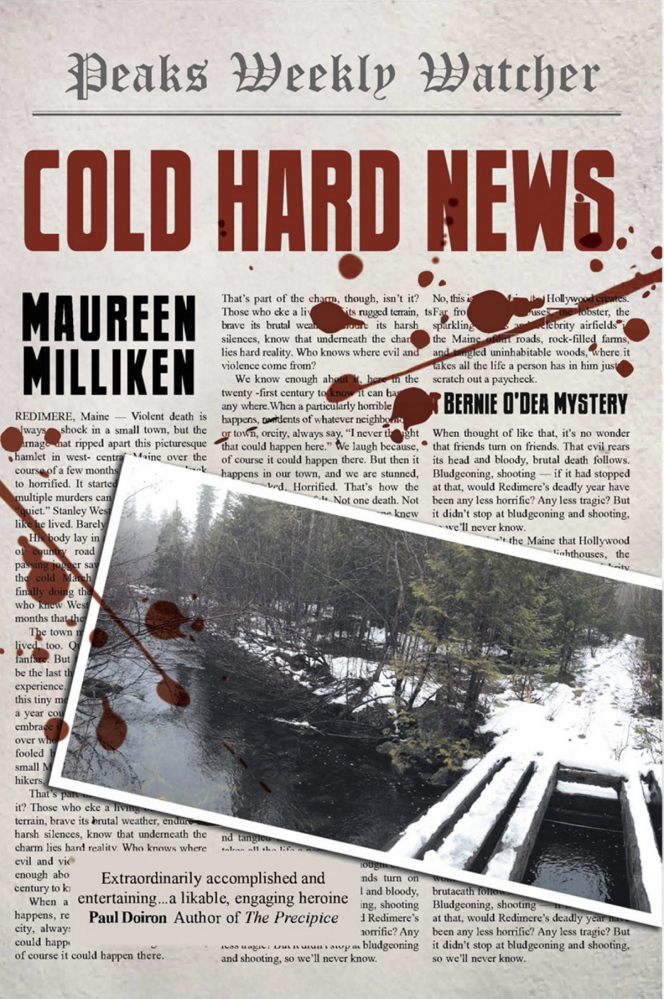On the cusp of spring in Redimere, Maine, a body emerges from a roadside snow bank. It is that of Stanley Weston, a well-known local who lived a quiet life in a dilapidated trailer outside of town, collecting disability checks from Veterans Affairs following a tour in Vietnam. People always saw him, coming and going, walking to and from town – but not since everyone thought he’d gone off to South Carolina to stay with a cousin for the winter. Despite heavy head trauma, the cause of death is “undetermined.” Common speculation is that he was hit by a snowplow during a blinding storm in mid-December.
Thus begins Maureen Milliken’s debut novel, “Cold Hard News.” Though most characters in the story accept the snowplow theory, Bernie O’Dea, editor of the “Peaks Weekly Watcher,” the town newspaper, and Pete Novotny, the new police chief, can’t shake the feeling that there is more to it than that.
In Milliken’s hands, absolutely. She builds the plot like someone meticulously laying kindling for a bonfire — stick by stick.
O’Dea started at the local paper after college and then went off to become an award-winning journalist at a large daily, until she was fired. Novotny was a noted detective in Philadelphia, until he had an incapacitating panic attic at a gruesome crime scene. Both drag their pasts along with them: O’Dea buying the local weekly from the retiring owner/editor, and Novotny being heavily recruited by Cal Littlefield, the retiring town police chief. Both are keenly aware of the constrictions of small town life, where everyone knows everyone and their business (or nearly so). Here, O’Dea’s reporting comes off to townspeople as being too pointed. Novotny, an outsider, is constantly compared with the old chief. These constraints dog them like phantoms. It is only natural, perhaps, that each is drawn to the other.
Milliken is a third-generation newspaper editor who started as an intern at the Portland Press Herald and is now an editor at the Kennebec Journal and Morning Sentinel, which share a parent company with the Maine Sunday Telegram. She sharply captures the sense and feel of old-school journalism in the age of the 24/7 news cycle and the Internet. As seen through O’Dea’s eyes, the modern pressures on newspapers are sad to witness.
The author also is superb at capturing the nuances and unseen tangles of life in a small town.
O’Dea is a wonderful character, a real snoop, careless about the bounds of propriety and, at times, the jurisdiction of law. On her own prerogative, she goes out to the victim’s trailer to “help” the landowner clean up the property, and walks off with a Lee Child’s novel, an Audubon bird book and two bags of trash. And — oh, yeah — a post office box key. This before Chief Novotny or anyone else with an interest can have a looksee. Later, the trash bags get stolen out of her car and the bird book from her apartment. She does manage, however, to keep hold of an indecipherable notebook she found in Weston’s post office box.
O’Dea and Novotny stumble ineptly toward a friendship, though both keep secrets and rightfully mistrust the forthrightness of the other. There’s hell to pay, however, when O’Dea, ever eager to get a scoop, publishes the chief’s confession to her of responsibility and guilt over the tangled deaths of a police officer and a local in a shootout.
Nothing and almost nobody is what or who they seem.
The plot’s complexity requires Milliken to spend the better part of three chapters to bring things to clarity. It all gets tied up — a bit too conveniently for my tastes — with the discovery of a trove of security videos, a witness and a confession. I don’t have a better suggestion for how it might have been handled, other than with greater foresight and balance in plotting.
That said, I thoroughly enjoyed “Cold Hard News.” I plan to snatch up the next book in Milliken’s planned crime series. Milliken is not only a strong writer but greatly imaginative. And O’Dea and Novotny are an inventive pairing, destined to continue to get in each other’s business — and into each other’s hearts.
Frank O Smith is a Maine writer and ghostwriter whose novel, “Dream Singer,” was named a Notable Book of the Year in Literary Fiction in 2014 by “Shelf Unbound” and was a finalist for the Bellwether Prize, created by best-selling novelist Barbara Kingsolver. Smith can be reached via his website, frankosmithstories.com.
Copy the Story LinkSend questions/comments to the editors.



Success. Please wait for the page to reload. If the page does not reload within 5 seconds, please refresh the page.
Enter your email and password to access comments.
Hi, to comment on stories you must . This profile is in addition to your subscription and website login.
Already have a commenting profile? .
Invalid username/password.
Please check your email to confirm and complete your registration.
Only subscribers are eligible to post comments. Please subscribe or login first for digital access. Here’s why.
Use the form below to reset your password. When you've submitted your account email, we will send an email with a reset code.